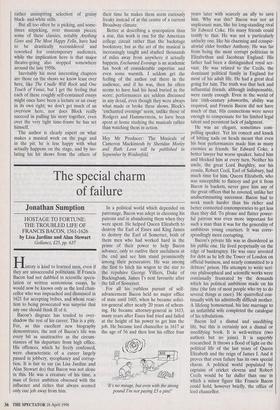The special charm of failure
Jonathan Sumption
HOSTAGE TO FORTUNE: THE TROUBLED LIFE OF FRANCIS BACON, 1561-1626 by Lisa Jardine and Alan Stewart Gollancz, £25, pp. 637 History is kind to learned men, even if they are unsuccessful politicians. If Francis Bacon had not dabbled in scientific specu- lation or written sententious essays, he would now be known only as the lord chan- cellor who was impeached and dismissed in 1621 for accepting bribes, and whose reac- tion to being prosecuted was surprise that any one should think ill of it.
Bacon's disgrace has tended to over- shadow the rest of his career. This is a pity. For, as this excellent new biography demonstrates, the rest of Bacon's life was every bit as unattractive as the circum- stances of his departure from high office. His offences, which he freely confessed, were characteristic of a career largely passed in jobbery, sycophancy and corrup- tion. It is fair to say (as Lisa Jardine and Alan Stewart do) that Bacon was not alone in this. He was a creature of his time, a man of fierce ambition obsessed with the influence and riches that always seemed only one job away from him. In a political world which depended on patronage, Bacon was adept in choosing his patrons and in abandoning them when they were spent. He helped Queen Elizabeth to destroy the Earl of Essex and King James to destroy the Earl of Somerset, both of them men who had worked hard in the prime of their power to help Bacon advance, only to outlive their usefulness at the end and see him stand prominently among their persecutors. He was among the first to hitch his wagon to the star to the repulsive George Villiers, Duke of Buckingham, James I's next favourite after the fall of Somerset.
For all his ruthless pursuit of self- advancement Bacon held no major office of state until 1605, when he became solici- tor-general after nearly 20 years of schem- ing. He became attorney-general in 1613, many years after Essex had tried and failed at the height of his power to get him the job. He became lord chancellor in 1617 at the age of 56 and then lost his office four It's no mirage, but even with the strong pound I'm not paying £3 a pint!' years later with scarcely an ally to save him. Why was this? Bacon was not an unpleasant man, like his long-standing rival Sir Edward Coke. His many friends could testify to that. He was not a particularly unlucky one, like his charming and conspir- atorial elder brother Anthony. He was far from being the most corrupt politician in Elizabethan and Jacobean England. His father had been a distinguished royal ser- vant. He was related to the Cecils, the dominant political family in England for most of his adult life. He had a great deal going for him. The truth was that luck and influential friends, although indispensable, were rarely enough. Even in the world of late 16th-century jobsworths, ability was required, and Francis Bacon did not have much of that. His connections were never enough to compensate for his limited legal talent and persistent lack of judgment.
He was an elegant, sometimes com- pelling speaker. Yet his conceit and knack of hitting nails on heads meant that even his best performances made him as many enemies as friends. Sir Edward Coke, a better lawyer but worse speaker, hated him and blocked him at every turn. Neither his uncle, the great Lord Burghley, nor his cousin, Robert Cecil, Earl of Salisbury, had much time for him. Queen Elizabeth, who was susceptible to flattery and got it from Bacon in buckets, never gave him any of the great offices that he coveted, unlike her undiscriminating successor. Bacon had to work much harder than his richer and better connected contemporaries to get less than they did. To please and flatter power- ful patrons was even more important for such a man than it was for the generality of ambitious young courtiers. It was corre- spondingly more corrupting.
Bacon's private life was as disordered as his public one. He lived perpetually on the edge of bankruptcy. He was once arrested for debt as he left the Tower of London on official business, and nearly committed to a debtors' prison. His attempts to write seri- ous philosophical and scientific works were continually frustrated by the demands which his political ambitions made on his time (the fate of most people who try to do several things at once). He quarrelled con- tinually with his admittedly difficult mother. A lifelong homosexual, his late marriage to an unfaithful wife completed the catalogue of his tribulations.
Bacon led a dismal and unedifying life, but this is certainly not a dismal or unedifying book. It is well-written (two authors but no joins). It is superbly researched. It throws a flood of light on the political life of the last years of Queen Elizabeth and the reign of James I. And it proves that even failure has its own special charm. A political world populated by captains of cricket elevens and Robert Cecils would be far duller than one in which a minor figure like Francis Bacon could hold, however briefly, the office of lord chancellor.


























































 Previous page
Previous page